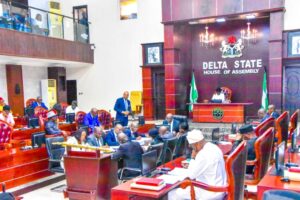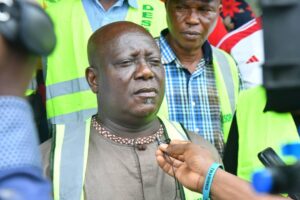THE NEED FOR THE FEDERAL GOVERNMENT TO ATTRACT MORE CAR MANUFACTURING COMPANIES TO NIGERIA
By Zik Gbemre
Without a doubt, for the Federal Government to fast track the nation’s economic growth and drastically reduce the unemployment crises in the country, there is need for prompt steps to be taken and more attention given to Nigeria’s automobile industry. This is one industry the Nigerian Government can use, if properly developed, to address and achieve a whole lot, which include the creation of vast employment opportunities, stop car smuggling across our borders/ports, ensure transfer of technology, stop capital flight, create vast opportunities for further industrialization of the nation’s economy, increase revenue from exports, and so much more. This is why we find it appalling that past and present Nigerian Governments have not taken advantage of this industry and the nation’s population to revamp the nation’s economy.
As a matter of fact, Nigeria has the potential to become the hub of Africa’s automobile industry because the country is home to an estimated 180 million people, over 40 million of who are in the growing middle class. This makes it to be seen as the continent’s largest economy, which is also increasingly seen as an attractive destination for investors across all sectors. That means, the “largely import dependent automobile industry” of Nigeria should become the focus of the present and future Nigerian Governments.
It is however sad that other African countries are the ones ahead of us in this regard. Recently, President Paul Kagame of Rwanda launched the first Rwandan Car Assembly Plant by Volkswagen with a notice that, the country and Africa is getting what it deserves; brand new cars instead of second hand (tokumbo) cars. In his words, Kagame said: “Africa does not need to be a dumping ground for second-hand cars, or second-hand anything. In the long run, you end up paying a higher price anyway.” Kagame was saying this from a recent development where taxes for second-hand clothes and footwear were increased to discourage entry of second hand and promote local apparel industry.
Similarly, two years ago, Rwanda adopted new depreciation rates on car taxation. The vehicles being assembled in Rwanda are VW Teramont, Passat and Polo models and THE PLANT IS EXPECTED TO EMPLOY 1000 WORKERS, MAINLY LOCALS, FROM 100 WORKERS CURRENTLY. Though, the said VW assembly plant in Rwanda is the fourth of its kind in Africa after Nigeria, Kenya and South Africa, however, it is rather unfortunate to see that South Africa is far ahead of Nigeria in the automobile industry development, while Nigeria has practically little to boast about in this area.
For instance, vehicle manufacturers such as BMW, Ford (incorporating Mazda), General Motors, Mercedes Benz, Nissan, Renault, Citroen, Honda, Toyota and Volkswagen – all have Production Plants in South Africa. While Component (spare parts) Manufacturers such as Arvin Exhaust, Bloxwitch, Corning, Senior Flexonics have also established Production Bases in South Africa. In fact, SOUTH AFRICA’S AUTOMOBILE INDUSTRY IS A GLOBAL, TURBO-CHARGED ENGINE FOR THE MANUFACTURE AND EXPORT OF VEHICLES AND COMPONENTS. MANY OF THE MAJOR MULTINATIONAL FIRMS USE SOUTH AFRICA TO SOURCE COMPONENTS AND ASSEMBLE VEHICLES FOR THE LOCAL AND INTERNATIONAL MARKETS. The sector is one of the South Africa’s most important, contributing at least 6% to the country’s GDP and accounting for almost 12% of South Africa’s manufacturing exports, making it a crucial cog in the economy.
In 2010 alone, 271 000 vehicles were exported. And also, as at 2010, more than 28, 000 people are directly employed in South Africa’s automotive manufacturing, with 65, 000 employed in the component manufacturing industry. About 200, 000 are employed in retail and aftermarket activities, with 6, 600 employed in the tyre manufacturing industry. We can go on to elaborate more statistics to show how the South African Government have used the automobile industry to bring about rapid development.
With its ability to link throughout the economy, the South African Government has identified the automobile industry as a key growth sector, hence it has always invested in this sector and with the right policies, to attract foreign investors. Some of the significant growth in South Africa’s automobile industry was under its Motor Industry Development Programme (MIDP), which doubled the size of this sector since 1994. Its successor, the Automobile Production and Development Programme, was implemented from 2013, and it aims to stimulate the expansion of local production to 1.2- million vehicles a year by 2020, while significantly increasing local content at the same time.
The big question is, what is the past and present Nigerian government being doing all these years to develop the nation’s automobile industry like its counterpart in Africa? Where is the Nigerian automobile industry positioned in Africa and around the globe? These questions are necessary because the auto policy implementation in the country has been neither here nor there, and the test centre for the country has remained a hard nut to crack. Looking at the automobile industry in Nigeria, which dates back to the 1950s and consists of the production of passenger cars and commercial trucks. Early production was led by United Africa Company’s Federated Motors Industries assembly line of Bedford TJ trucks and SCOA’s production of Peugeot 404 pickup trucks. Significant development began in the 1970s, during a period of oil boom, the Federal Government of Nigeria signed joint venture partnerships with foreign car manufacturers to assemble vehicles and provide technical assistance towards vertical integration within the local industry.
These foreign brands dominated the industry from the middle of the 1970s to the end of the 1980s, the passenger vehicles brands were Peugeot Nigeria Ltd and Volkswagen. The commercial vehicles manufacturers, Leyland, Anambra Motor Manufacturing, and Steyr competed with Bedford truck for dominance. But the companies simply assembled kits and completely knocked down parts imported from abroad. And in the marketplace, demand was largely dictated by the government’s budgetary concerns. Towards the end of the 1980s, a downturn in the economy, mixed with government’s inconsistency and the higher cost of locally manufactured cars compared to imported counterparts negatively affected the industry.
By 2000, used foreign cars dominated car sales in the country, also the rise in imports and smuggling of affordable used cars (especially from neighboring African countries), negatively impacted the development of a vertically integrated industry. It was only some few years ago that, a local brand, Innoson Vehicle Manufacturing (IVM)s, opened an assembly plant in the country. in fact, since the beginning of democratic governance in 1999, the Nigerian Government has been selling its equity stake in the assembly plants. Volkswagen was sold to the Stallion Group; PAN’s stake was bought by ASD Motors. PAN, Stallion and local brand Innoson Vehicle Manufacturing are the major local assembly plants in the country. But Stallion mostly assembles partially knocked down parts. While Innoson Vehicle Manufacturing was commissioned in 2010 with an installed capacity of 10,000 vehicles a year, in 2015, the planned production target was 6,000 vehicles. in 2009, PAN started a new production line switching from 406 to 307 models.
That is the sad summary of the history of Nigeria’s automobile industry. We are aware of the National Automotive Design and Development Council (NADDC), which was set up to evolve new strategies of solving the challenges bedeviling the auto industry in Nigeria. But not much has been seen from that council largely because, the Government has not done what they are supposed to do. And we are not the only ones who are not happy with this situation.
Worried by the slow development in the Nigeria’s automobile sector, Managing Director of BKG Exhibitions, Mr. Ifeanyi Agwu, charged the Federal Government some few months ago, to pay more attention to reviving the nation’s automobile sector, saying it is the remedy to the development of the country’s economy. In his words, “the automobile sector is very key to the development of the nation’s economy and cannot be allowed to suffer as it is presently.
We need to get the machinery right and policies too. If the policy is not right, we will be moving in a circle and not forward.” Agwu regretted that despite our huge resources and population in the continent, we are yet to develop at the right pace in this sector.
“Nigeria is a major market, yet there are more vehicles imported into Niger and Benin Republic which later end up in Nigeria, through illegal means. The Nigerian government is the loser because it is creating business opportunities and revenues for neighboring countries and the ‘UNDERWORLD MARKET’ TO ITS DETRIMENT.’’ This means that Nigeria is fast losing employment opportunities that would have come from the automobile sector.
“The whole world knows that Nigerians love cars. If we leave the tax and duties at 70 percent as it is presently, the cars will continue to come through illegal means and the country will continue to lose huge revenue annually.”
As it is, Agwu noted that the grey market controls the nations automobile sector which should not be the case but pointed out that if the Federal Government gives the right attention to the automobile sector Nigerian will see the difference in four years. He also made case for the setting up of technical schools like the ones in Ghana, Benin Republic and even Germany, to address the manpower problem and issue of quacking in the automobile sector. Industry expert have noted that the fortunes of the local automobile industry in Nigeria have been on a downward slide over the years, fueled by vehicle and spare parts imports. The result has been huge capital flight out of the country with the resultant implication on job creation and loss to economy.
The National Automobile Design and Development Council (NADDC) estimated that up to 2015, Nigeria imported about 400,000 vehicles valued at $4.2 billion annually, made up of 100,000 new vehicles and 300,000 used ones (also called tokumbo). The council estimates that the automobile import market in Nigeria is worth $6.5 billion annually, and this is the amount of money Nigeria can save if the local industry is fully developed and import ceases. There was a time in this country, particularly during the era of Shehu Shagari, when the official car of all government officials across all levels of government was Peugeot 504 produced by PAN. Aside the President who used a Mercedes Benz, the official car for all the other Federal and State Government officials was the Peugeot 504. This was the official policy of the then Federal Government, which was a way to encourage domestic production and cars and its patronage by Nigerians.
Even Teachers, could afford to buy a brand-new Peugeot 504 PAN of Peugeot and Volkswagen, by installment payments. Up till Buhari/Idiagbon regime back then, all Government officials were using Made-In-Nigeria Peugeot and Volkswagen cars. It was Gen. Ibrahim Babaginda (Rtd) military’s regime that abandoned that policy and from then on, Nigeria became a dumping ground for used cars.
This is why we believe there is need for the current Federal and State Governments, including Federal and State Lawmakers and the various Departments/Agencies, should start patronizing the Made-In-Nigeria cars, just like it was done in the past with Peugeot and Volkswagen being the officials cars of the Government. Now that we have domestic manufacturers like Innoson Vehicle Manufacturers (IVM), there is need for the Government to encourage such car manufacturing companies to grow and expand with more Plants across the country to manufacture cars.
The Nigerian Federal Government cannot be preaching to Nigerians to patronize Made-In-Nigeria products, when they themselves are not seen to be doing so. They should practice what they preach, especially in the nation’s automobile sector. It is also time for the Nigerian Government to increase its tempo by taking aggressive steps to partner with foreign investors to set-up/build Plants to manufacture Toyota of all brands, Ford, Renault, Fiat, Mercedes Benz, Nissan, Kia, Hyundai, Citroen, Honda, Range Rover/Land Rover, etc. and these Plants should also produce genuine spare parts for the various models in Nigeria. With this in place, there is no way the price of cars of all models will not drastically come and affordable for most working class Nigerians. The truth is that we have the market, the manpower population and the resources and wherewithal to use the nation’s automobile industry to transform the country’s fortunes in the near and far future.
The global automobile industry is looking for new growth opportunities and those opportunities reside in Africa, particularly in Nigeria, regarded as the continent’s largest economy and by far the most populated. This presents huge opportunities for investors in the automobile space. Creating employment opportunities is not by building structures or creating more offices and Departments within the Government and collar-based sectors. Creating rapid jobs is about the Government going into partnership with foreign and domestic investors in the automobile industry, to bring them in to do the transformation and development needed in this sector. The Government’s main job is to enact the right policies and business-friendly environment that would encourage all of this at a tremendous scale. The Nigerian automobile sector is something that the Federal Government should seriously and promptly focus on, especially since the larger population of Nigerians are desirous to own cars.
In advanced countries like the US, car is not a luxury but a necessity, hence it is readily affordable and available by most Americans. Until this sector is properly developed in Nigeria, car smuggling from neighboring countries will never stop.
Zik Gbemre, JP.




